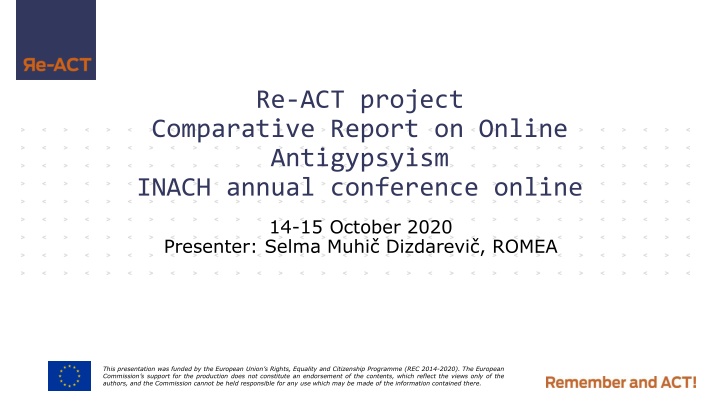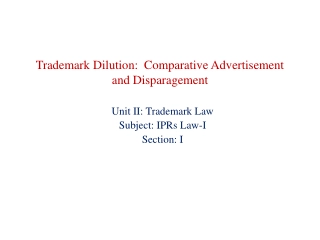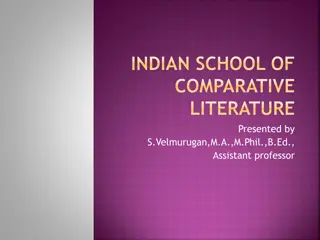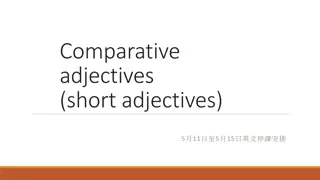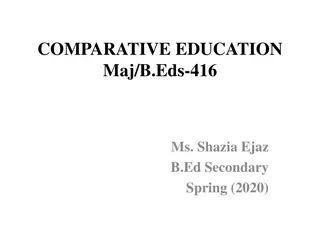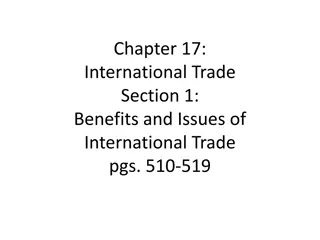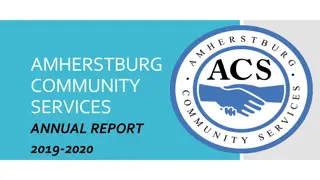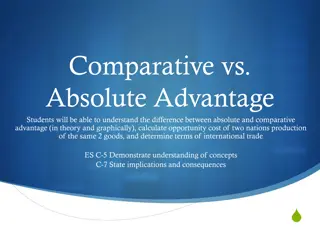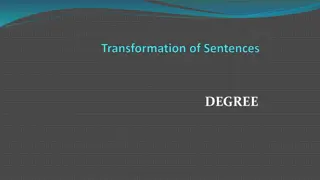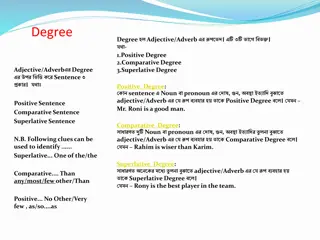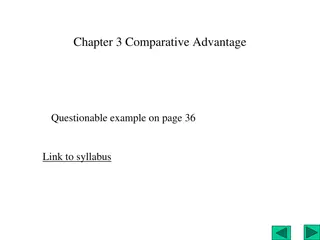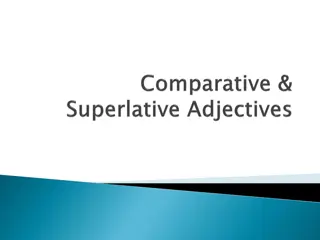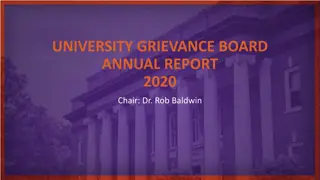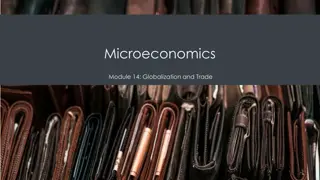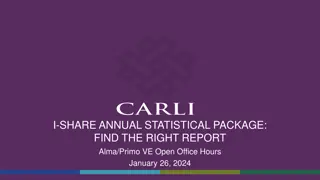Comparative Report on Online Antigypsyism - INACH Annual Conference 2020
This report presents findings on online antigypsyism from the INACH annual conference 2020. It addresses key definitions, common prejudices, and features the Roma community faces online and offline. The report highlights the monitoring of antigypsyist hate speech in the EU and sheds light on the challenges faced by the Roma community in combating discrimination and stereotypes online.
Download Presentation

Please find below an Image/Link to download the presentation.
The content on the website is provided AS IS for your information and personal use only. It may not be sold, licensed, or shared on other websites without obtaining consent from the author.If you encounter any issues during the download, it is possible that the publisher has removed the file from their server.
You are allowed to download the files provided on this website for personal or commercial use, subject to the condition that they are used lawfully. All files are the property of their respective owners.
The content on the website is provided AS IS for your information and personal use only. It may not be sold, licensed, or shared on other websites without obtaining consent from the author.
E N D
Presentation Transcript
Re-ACT project Comparative Report on Online Antigypsyism INACH annual conference online 14-15 October 2020 Presenter: Selma Muhi Dizdarevi , ROMEA This presentation was funded by the European Union s Rights, Equality and Citizenship Programme (REC 2014-2020). The European Commission s support for the production does not constitute an endorsement of the contents, which reflect the views only of the authors, and the Commission cannot be held responsible for any use which may be made of the information contained there.
Definitions Elements of definitions of antigypsyism relevant for online hate: painting all Roma with the same brush, assigning collective guilt to the whole community and each Roma individual, claiming that the essence of being Roma exists and negatively affects their ability to work or adapt to majority society, discriminating, segregating, excluding, ostracizing and calling for violence toward Roma people. This presentation was funded by the European Union s Rights, Equality and Citizenship Programme (REC 2014-2020). The European Commission s support for the production does not constitute an endorsement of the contents, which reflect the views only of the authors, and the Commission cannot be held responsible for any use which may be made of the information contained there.
Common prejudices/features online and offline Roma as quintessential minority without mother state Stereotypically presented as musicians, dancers and palm- readers but also liars, thieves and cheats Inherently unable to adapt or integrate into majority society, culture, norms As a rule discriminated in housing, job market, education, and health care. This presentation was funded by the European Union s Rights, Equality and Citizenship Programme (REC 2014-2020). The European Commission s support for the production does not constitute an endorsement of the contents, which reflect the views only of the authors, and the Commission cannot be held responsible for any use which may be made of the information contained there.
Monitoring of antigypsyist hate speech EU monitoring exercises During the first three monitoring exercises out of the total of five, carried out in 2016, 2017 and 2018 respectively, the category antigypsyism was not even included as a possible ground for hate speech online. In 2019 when the category was introduced, it ranked 4thafter xenophobia, sexual orientation and anti-Muslim hate. In the 5th monitoring exercise evaluation the ranking was sexual orientation, xenophobia (including anti-migrant hate) and antigypsyism. The ranking reflects the frequency of illegal hate entries on the monitored platforms based on data provided by NGOs. This presentation was funded by the European Union s Rights, Equality and Citizenship Programme (REC 2014-2020). The European Commission s support for the production does not constitute an endorsement of the contents, which reflect the views only of the authors, and the Commission cannot be held responsible for any use which may be made of the information contained there.
sCan report on antigypsyism online The most common narrative related to antigypsyist hate speech online can be clustered in three groups of slurs: criminalization, welfare chauvinism and dehumanization. This culture is then depicted by claiming that Romani people are 'lazy', 'work-shy' and dependent of social benefits either as migrants or as national minorities. This in turn leads to welfare chauvinism and to demands that they be excluded from social aid system, which is the same claim applied to non-Romani migrants. Sinti and Romani people are defamed as 'parasites', 'vermin', 'rats' or 'disgusting animals'. In the Czech Republic, a high ranking politician posted on Facebook that "Gypsies are like jellyfish - poisonous and useless". In Austria, a Twitter user tweeted "A wise man once said that Gypsies are not human beings. I agree with him". This presentation was funded by the European Union s Rights, Equality and Citizenship Programme (REC 2014-2020). The European Commission s support for the production does not constitute an endorsement of the contents, which reflect the views only of the authors, and the Commission cannot be held responsible for any use which may be made of the information contained there.
Reports on antigypsyism online Especially persistent trend in the antigypsyism is denying, mocking or supporting Roma Holocaust. In the Czech Republic, a photograph of a first grade class in a local primary school that was comprised predominantly of children of either Arab, Romani or Vietnamese origin was commented on with a call to "gas" all the children, evoking the genocide during the Nazi occupation. In Austria, the slogan "Roma rauSS" was used to call for deportations a deliberate spelling mistake to hint at the infamous SS. Other examples include "Hitler would be needed!!!! Let's kill all the gypsies!!!" (Slovenia) and "Uncle Adolf had already tried some politically incorrect remedies but he didn't succeed either" (Italy). This presentation was funded by the European Union s Rights, Equality and Citizenship Programme (REC 2014-2020). The European Commission s support for the production does not constitute an endorsement of the contents, which reflect the views only of the authors, and the Commission cannot be held responsible for any use which may be made of the information contained there.
Reports on antigypsyism online Fake news/hoaxes and de-contextualization are the prominent tools for spreading hate. In the Czech Republic, fake news reports about privileges that Romani people allegedly receive, such as special social benefits or free prescription drugs, are particularly persistent. Some fake news are recycled with suspicious regularity. This presentation was funded by the European Union s Rights, Equality and Citizenship Programme (REC 2014-2020). The European Commission s support for the production does not constitute an endorsement of the contents, which reflect the views only of the authors, and the Commission cannot be held responsible for any use which may be made of the information contained there.
Roma Civil Monitor Synthesis Report Information on the progress of Roma integration in 27 Member States, is a result of observations of 90 NGOs and individual experts. A high number of the RCM reports attest to the prevalence and rising incidence of hate speech towards the Roma in the media and on social media. There appears to be a rising trend of online hate speech and antigypsyism directed at the Roma. This presentation was funded by the European Union s Rights, Equality and Citizenship Programme (REC 2014-2020). The European Commission s support for the production does not constitute an endorsement of the contents, which reflect the views only of the authors, and the Commission cannot be held responsible for any use which may be made of the information contained there.
Intersectional issues affecting online hate speech Being a Roma woman (misogyny from majority but also within the Roma community plus antigypsyism) Being an LGBT+ Roma (homophobia from majority but also within the community plus antigypsyism) Being a Roma migrants from EU or non-EU (xenophobia, anti- refugee hate plus antigypsyism) This presentation was funded by the European Union s Rights, Equality and Citizenship Programme (REC 2014-2020). The European Commission s support for the production does not constitute an endorsement of the contents, which reflect the views only of the authors, and the Commission cannot be held responsible for any use which may be made of the information contained there.
Thank you for your attention! Any questions, or comments, please contact me at selmamuhdiz@gmail.com You can download the full report here: https://react.inach.net/publications/ This presentation was funded by the European Union s Rights, Equality and Citizenship Programme (REC 2014-2020). The European Commission s support for the production does not constitute an endorsement of the contents, which reflect the views only of the authors, and the Commission cannot be held responsible for any use which may be made of the information contained there.
Sources for the presentation Data from the 4th monitoring exercise evaluation, available at https://ec.europa.eu/info/sites/info/files/code_of_conduct_factsheet_7_web.pdf (last accessed 11.9.2020). Data from the 5th monitoring exercise evaluation, available at https://ec.europa.eu/info/sites/info/files/codeofconduct_2020_factsheet_12.pdf (last accessed 11.9.2020). Loveland, M. T. and Popescu, D., 2016. The Gypsy Threat Narrative: Explaining Anti - Roma Attitudes in Europe . In Humanity and Society Humanity & Society 2016, Vol. 40(3). P. 329-352. Available at http://journals.sagepub.com/doi/pdf/10.1177/0160597615601715 (last accessed 11.09.2020). Roma Civil Monitor, 2020. Available at https://cps.ceu.edu/sites/cps.ceu.edu/files/attachment/basicpage/3172/rcm- civil-society-monitoring-report-synthesis27-2020-eprint-fin.pdf (last accessed 12.9.2020). sCan project , Antigypsyism on the Internet , 2018. Available at http://scan-project.eu/wp-content/uploads/scan- antigypsyism.pdf (last accessed 11.09.2020). sCan project, 2019. Intersectional Hate Speech Online. Available at http://scan-project.eu/wp- content/uploads/sCAN_intersectional_hate_final.pdf (last accessed 12.9.2020). This presentation was funded by the European Union s Rights, Equality and Citizenship Programme (REC 2014-2020). The European Commission s support for the production does not constitute an endorsement of the contents, which reflect the views only of the authors, and the Commission cannot be held responsible for any use which may be made of the information contained there.
THANK YOU! This presentation was funded by the European Union s Rights, Equality and Citizenship Programme (REC 2014-2020). The European Commission s support for the production does not constitute an endorsement of the contents, which reflect the views only of the authors, and the Commission cannot be held responsible for any use which may be made of the information contained there.
